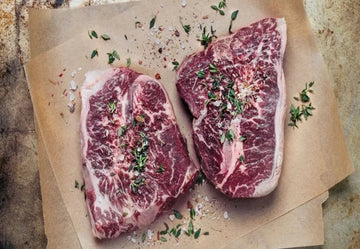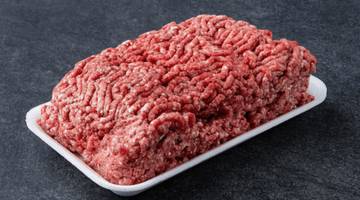
"A well-balanced diet is the foundation of good health."
This timeless piece of advice holds true even in the fast-paced modern world. One key aspect of a balanced diet is the inclusion of various protein sources, and beef, with its rich nutritional profile, is a valuable addition. In this blog post, we will delve into the realm of nutrients in beef and explore its role in a healthy diet.
What is the nutritional value of eating beef?
Beef is a good source of high-quality protein, essential amino acids, vitamins (B12, B6, niacin), and minerals (iron, zinc, phosphorus). However, it can also be high in saturated fats and cholesterol. Choosing lean cuts and moderate consumption can provide beneficial nutrients without excessive unhealthy components.
As a protein source, beef is in high demand since it is a nutritional powerhouse. The B vitamins B12, B6, niacin, and riboflavin, as well as the minerals iron, zinc, and selenium, are all present in a typical beef portion. Also, beef is a fantastic source of high-quality protein and contains all the essential amino acids our bodies require.
Beef's nutritional richness makes it stand out when compared to other protein sources. For instance, three cups of quinoa and 1.5 cups of black beans have about the same amount of protein as a 3-ounce plate of lean beef. Because of this, beef is a good choice for daily protein intake.
Beef, lamb, and pork all fall under the broad category of "red meat." Beef stands out among them as a great provider of necessary nutrients. While it's vital to consider nutrients, it's also important to avoid generalizing about all red meats.
Higher iron content and a better amino acid profile in beef than in other red meats are just some of its special benefits. The nutrient makeup of beef can also change depending on elements, including the breed of cattle, their nutrition, and the processing techniques, according to the study.
Is beef high in calories and fat content?
Despite its remarkable nutritional profile, beef is often associated with concerns about its calories and fat content. However, it's essential to debunk the myths and misconceptions surrounding this topic. While it's true that beef contains calories and fat, the key lies in choosing the right cuts.
Lean cuts of beef, such as sirloin steak and tenderloin, are lower in fat content while still delivering a substantial amount of protein. Incorporating these lean cuts into your diet can help you enjoy the benefits of beef without excessive calorie intake.

What are the Key nutrients in beef?
Beef is a premier protein source due to several essential elements. Protein, an essential component of our bodies, is essential for muscle growth, repair, and general health. Beef is also a noteworthy source of zinc, which promotes immunological health, and iron, which helps with oxygen delivery.
Beef is a crucial component of a balanced diet since these nutrients synergistically support many biological functions.
How much Protein is available in beef?
Protein, the backbone of muscle tissue, is a top priority for individuals engaged in physical activity or seeking to maintain muscle mass. Beef offers a significant advantage, as it contains high-quality protein that our bodies efficiently utilize.
The protein found in beef contains all the essential amino acids, making it a complete protein source. It means that beef synthesizes various proteins in our bodies, supporting vital functions like enzyme production, immune response, and hormone regulation.
What are the health benefits of eating beef?
Beyond its impressive nutrient profile, beef offers various health benefits.
- The rich iron content in beef aids in preventing anemia, a condition characterized by low hemoglobin levels.
- Furthermore, the zinc present in beef supports the immune system, helping the body defend against infections.
- For certain population groups, such as pregnant women, beef's nutritional advantages can be precious in promoting healthy fetal development.
Also Read- Benefits of Grass-Fed Beef for a Healthy Diet!
What are some Interesting Facts about beef?
Beyond its nutritional merits, beef holds intriguing facts and topics worth exploring.
- Pork is the most widely eaten meat globally, followed by poultry, beef, and goats/sheep.
- According to the United Nations Food and Agriculture Organization, 24% of the world's population eats beef.
- Cattle were domesticated around 8000 BC when the benefits of having livestock became apparent.
- In the United States, beef consumption is around 30 billion pounds.
- Based on the most recent available data, Americans consume an average of about 57 pounds of beef per person per year.
How many nutrients is available in 100 grams of beef?
Here's the nutrition information for "Beef, ground beef, 85% lean meat / 15% fat, broiled" presented in a table format:
|
Nutrient |
Amount Per 100 grams |
% Daily Value (based on a 2,000-calorie diet) * |
|
Calories |
250 |
- |
|
Total Fat |
15 g |
23% |
|
Saturated Fat |
6 g |
30% |
|
Trans Fat |
1.1 g |
- |
|
Cholesterol |
90 mg |
30% |
|
Sodium |
72 mg |
3% |
|
Potassium |
318 mg |
9% |
|
Total Carbohydrate |
0 g |
0% |
|
Dietary Fiber |
0 g |
0% |
|
Sugar |
0 g |
- |
|
Protein |
26 g |
52% |
|
Vitamin C |
0% |
- |
|
Calcium |
1% |
- |
|
Iron |
14% |
- |
|
Vitamin D |
1% |
- |
|
Vitamin B6 |
20% |
- |
|
Cobalamin (Vitamin B12) |
43% |
- |
|
Magnesium |
5% |
- |
*Percent Daily Values are based on a 2,000-calorie diet. Your daily values may be higher or lower depending on your calorie needs.
Please note that the values provided are approximate and may vary based on the specific type and preparation of the ground beef. Always refer to the product's packaging or official sources like the USDA-certified ranch for the most accurate and up-to-date nutritional information.
Conclusion
Beef's nutrition facts highlight its status as a nutritional powerhouse, offering essential vitamins, minerals, and high-quality protein. By choosing lean cuts and incorporating beef into a balanced diet, individuals can reap the numerous health benefits it provides.
As we savor the delicious flavors of beef-based dishes, let us also be mindful of sustainability and ethical practices, ensuring a healthier future for ourselves and the planet.
For more information and to explore delicious beef options, visit 3lakesranch.net. Get access to a variety of responsibly sourced, high-quality beef products that will elevate your culinary experience.



